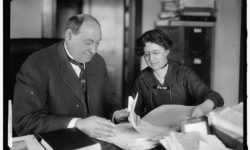Theodore Roosevelt, Harvey W. Wiley and Upton Sinclair’s book
How progressive reformers used the public outrage over Upton Sinclair’s book
In this lesson, students learn how Progressive reformers in government used the public outrage over Upton Sinclair’s book The Jungle as a catalyst for legislation. The story of how two progressives, Theodore Roosevelt and Harvey W. Wiley, worked together within the federal government is not as well-known as the role played by Sinclair’s The Jungle, but it provides the needed historical and political context for the landmark Progressive era legislation.

Identify two reasons why the Upton Sinclair wrote The Jungle
- Students will be able to identify two reasons why the Upton Sinclair wrote The Jungle
- Students will be able to identify President Theodore Roosevelt and Harvey W. Wiley and explain how they worked together to pass legislation to protect consumers
Activity 1. Upton Sinclair’s “The Jungle”
Pre-class: When students enter the classroom, project an image of several different types of meat to engage their interest. Show Chicago meat industry images of the time period. Use Play Slideshow on Picryl.com to launch full-screen slideshow.
- Generate a short discussion, connecting what students ate for their last meal and its source.
- Explain that food supplies were once not as safe and reliable as they now are.
- Pass out copies of an excerpt from chapter 14 of The Jungle. After reading and clarifying the questions below, ask the students to engage in a close reading discussion. This can be completed in small groups of three or four, based on the familiarity of the class with the task. Questions might include:
What clues show you the position of the author?
Point to the evidence presented in the book.
What reasons does the author give for reform? What examples support these reasons?
Share a sentence that supports the author’s view.
What is the purpose of this piece? What are the clues that tell you about this?
What does the author propose as reform? What evidence is given?
What do you predict happened next? What are the clues that make you think so?
Group Discussion
Preface the discussion with the comment that Upton Sinclair was largely unhappy with the reaction to his book. He had hoped to focus on the ways that immigrants were being exploited in Chicago; most Americans instead focused on the section that discussed the meatpacking industry, in which many of them worked.
Ask students
- Why would Sinclair be disappointed with the public’s reaction to his novel?
- Why did Sinclair think his novel would help lead to a wider revolution of the working class in America?
- Why was the working class reluctant to push for more government regulation of labor conditions in the U.S.?
Formative Assessment
Give students an exit card on which they explain several reasons why Sinclair wrote his book and also why he was disappointed with the reactions of readers.
Activity 2. Progressive reformers in Government: Theodore Roosevelt and Harvey Washington Wiley
- Direct students to a collection of President Theodore Roosevelt.
- Perform a quick search for Harvey Washington Wiley and Upton Sinclair.
- Have students read a background essay on the role of Harvey Washington Wiley (focus on paragraphs 3–5).
- Have students work in small groups to search relevant images, read both essays and answer the set of questions below
Questions for the poster might include:
- When was Theodore Roosevelt president?
- What is the meaning and significance of the word “vision” in the progressive reformers context?
- What does the quote from Roosevelt mean in the context of progressive reformers agenda?
- Find pictures relates to the journalist/novelist Upton Sinclair?
- What sentence in the text relates to the book The Jungle?
Questions for the Wiley article
- What information do we learn from the first paragraph that is relevant to this lesson?
- What does the second paragraph tell us about the context of Wiley’s long career?
- Do you think it is important that Wiley had a medical degree and taught chemistry? If so why?
- What was his “passion” according to the fourth paragraph?
- In the next paragraph, we learn about Wiley’s role in the passage of the Pure Food and Drug Act? How would you state that role in your own words?
- What does the newspaper headline on Wiley’s retirement from the government tell us about his impact?
Formative Assessment
Have students write short five paragraph essay responding to this prompt: Does what you learned about the “vision” of Theodore Roosevelt and the “passion” of Harvey Washington Wiley change how you think about the role of Upton Sinclair’s Jungle in the fight for Progressive reform?
Assessment
Have students write a short five paragraph essay that grapples with this prompt: The focus of this lesson is the twin passage of the landmark Meat Inspection Act and the Pure Food and Drug Act in June 1906. What can be learned about the role of investigative journalism, the role of science and the importance of political leadership from this achievement?
Media Files Source: Picryl.com
Picryl provides public domain, free to use, no copyright media resources from finest world’s archives. Search for specific topics, prepare your own lessons with media to use anywhere without any restrictions.
![]()

The media sources noted above are licensed under CC0 “No Rights Reserved” or Public Domain Mark License.
Lesson Plans Source: NEH.gov.
NEH holds the copyright for lesson plans and licenses such content under a Creative Commons Attribution 4.0 International License that allows subsequent users to copy, distribute, transmit, and adapt the content and requires such users to attribute the work to NEH.

The open source works noted above are licensed under a Creative Commons Attribution 4.0 International License.


